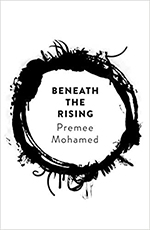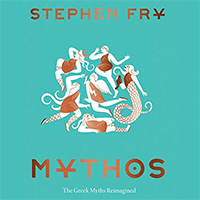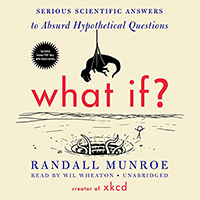Beneath the Rising, by Premee Mohamed
 A novel of adventure, science fiction, and magic. Two teens from Canada embark on a mission to save the world. Though “mismatched” in terms of their demographics and wealth, they are united by the fact that they met as children when one terrorist’s bullet pierced them both. The story is told from the perspective of the boy, Nick, but what’s immediately crazy about the situation is his friend Joanna (nicknamed Johnny) is the smartest person in the world, having invented dozens of inventions that have reached every corner of the world and improved humanity’s lot. In the beginning of the story, she “does it again,” with a small, simple reactor that generates unlimited clean energy. But the new machine comes with a fearsome cost, bringing evil creatures into our world. Johnny knows how to stop it, but can she complete her globetrotting quest without Nick, despite his quotidian abilities? There pop-culture-infused banter is entertaining, but is there more to their relationship than meets the eye?
A novel of adventure, science fiction, and magic. Two teens from Canada embark on a mission to save the world. Though “mismatched” in terms of their demographics and wealth, they are united by the fact that they met as children when one terrorist’s bullet pierced them both. The story is told from the perspective of the boy, Nick, but what’s immediately crazy about the situation is his friend Joanna (nicknamed Johnny) is the smartest person in the world, having invented dozens of inventions that have reached every corner of the world and improved humanity’s lot. In the beginning of the story, she “does it again,” with a small, simple reactor that generates unlimited clean energy. But the new machine comes with a fearsome cost, bringing evil creatures into our world. Johnny knows how to stop it, but can she complete her globetrotting quest without Nick, despite his quotidian abilities? There pop-culture-infused banter is entertaining, but is there more to their relationship than meets the eye?
Mythos, by Stephen Fry
 A free audiobook in Audible, at least through the end of this month. It’s all of Greek mythology, retold in the inimitable style of comedian Stephen Fry. It’s really, really good. Perfect bite-sized chapters, organized chronologically, and connecting the stories from antiquity with modern words and phrases. It is flooring to realize how much we are constantly surrounded by hand-me-downs from Greek mythology in modern American life, even if we are utterly aware of it. The antecedents in this collection persist in thousands of threads that bind together modern society. And it’s so well told! I found it absolutely charming to listen to; Fry’s language, voice, and choice of connections to elucidate make the listen a totally engaging experience. It’s scholarly, in a way – Fry backs out of the story to note areas of uncertainty when appropriate, about who begat who, or subtleties of translation, or where scholars don’t agree, but for the most part it’s a rollicking tale of good, evil, pride, greed, guile, innocence, and every other aspect of the human experience. Highly recommended.
A free audiobook in Audible, at least through the end of this month. It’s all of Greek mythology, retold in the inimitable style of comedian Stephen Fry. It’s really, really good. Perfect bite-sized chapters, organized chronologically, and connecting the stories from antiquity with modern words and phrases. It is flooring to realize how much we are constantly surrounded by hand-me-downs from Greek mythology in modern American life, even if we are utterly aware of it. The antecedents in this collection persist in thousands of threads that bind together modern society. And it’s so well told! I found it absolutely charming to listen to; Fry’s language, voice, and choice of connections to elucidate make the listen a totally engaging experience. It’s scholarly, in a way – Fry backs out of the story to note areas of uncertainty when appropriate, about who begat who, or subtleties of translation, or where scholars don’t agree, but for the most part it’s a rollicking tale of good, evil, pride, greed, guile, innocence, and every other aspect of the human experience. Highly recommended.
How College Works, by Daniel F. Chambliss and Christopher G. Takacs
 An interesting and readable report on a multi-year qualitative study of factors that manifest in a successful college experience. The study was conducted at Hamilton College in New York, which is selective, private, small, and well-funded. I found much of the study to be insightful and meaningful, for instance that the most powerful part of the college experience is connecting with other people – friends, effective professors, and mentors. Other parts, like the powerful sense of identity that comes from exclusivity, seemed to me to be antithetical to the realm of higher education in which I teach: the community college. Where I work, it’s all about open access: anyone and everyone in our community is welcome to attend. A comparison may be valid here. Elsewhere, the authors note the the “small class size” metric by which colleges are judged (by the U.S. News & World Report rankings, for instance) is a flawed measure: for every student in a sought-after small class, there are some number of students who couldn’t get into it, and are in some other class instead – a larger one, perhaps, or perhaps a small class they hate (a required freshman seminar can be more nuisance than nirvana if you can’t get into your top few choices). I see the psychological benefits of exclusivity similarly: those on the inside may well bond and meld due to the institution’s (or fraternity’s, or band’s) strict requirements to enter (including financial), but that means you don’t get to hear the perspectives of those who are shut out of the group. Community colleges don’t have that issue. But I digress: Overall, I found How College Works to be an inspiring read. Connecting with students to support their success is my primary goal, and the primary unit by which colleges should be evaluated should be students, not courses, departments, or other institutional metrics. It’s about the students. We do well to ask them what they think.
An interesting and readable report on a multi-year qualitative study of factors that manifest in a successful college experience. The study was conducted at Hamilton College in New York, which is selective, private, small, and well-funded. I found much of the study to be insightful and meaningful, for instance that the most powerful part of the college experience is connecting with other people – friends, effective professors, and mentors. Other parts, like the powerful sense of identity that comes from exclusivity, seemed to me to be antithetical to the realm of higher education in which I teach: the community college. Where I work, it’s all about open access: anyone and everyone in our community is welcome to attend. A comparison may be valid here. Elsewhere, the authors note the the “small class size” metric by which colleges are judged (by the U.S. News & World Report rankings, for instance) is a flawed measure: for every student in a sought-after small class, there are some number of students who couldn’t get into it, and are in some other class instead – a larger one, perhaps, or perhaps a small class they hate (a required freshman seminar can be more nuisance than nirvana if you can’t get into your top few choices). I see the psychological benefits of exclusivity similarly: those on the inside may well bond and meld due to the institution’s (or fraternity’s, or band’s) strict requirements to enter (including financial), but that means you don’t get to hear the perspectives of those who are shut out of the group. Community colleges don’t have that issue. But I digress: Overall, I found How College Works to be an inspiring read. Connecting with students to support their success is my primary goal, and the primary unit by which colleges should be evaluated should be students, not courses, departments, or other institutional metrics. It’s about the students. We do well to ask them what they think.
What If?: Serious Scientific Answers to Absurd Hypothetical Questions, by Randall Munroe
 Such a fun book: I can’t believe it’s taken me this long to read it! (It was released in 2014; I listened to the Wil Wheaton narration.) The premise is that readers of XKCD send in questions – ridiculous questions – and then author Munroe does his best to answer them, with math, research, and humor. The result is very entertaining, and occasionally insightful. I had such fun reading it (listening to it). For what it’s worth, Wil Wheaton does an amazing job inflecting the nerdy umbrage of the text. Also worth noting is that the sequel, What if? 2, is about to be published, and based on a preview in this month’s WIRED magazine, looks to be just as delightful!
Such a fun book: I can’t believe it’s taken me this long to read it! (It was released in 2014; I listened to the Wil Wheaton narration.) The premise is that readers of XKCD send in questions – ridiculous questions – and then author Munroe does his best to answer them, with math, research, and humor. The result is very entertaining, and occasionally insightful. I had such fun reading it (listening to it). For what it’s worth, Wil Wheaton does an amazing job inflecting the nerdy umbrage of the text. Also worth noting is that the sequel, What if? 2, is about to be published, and based on a preview in this month’s WIRED magazine, looks to be just as delightful!
